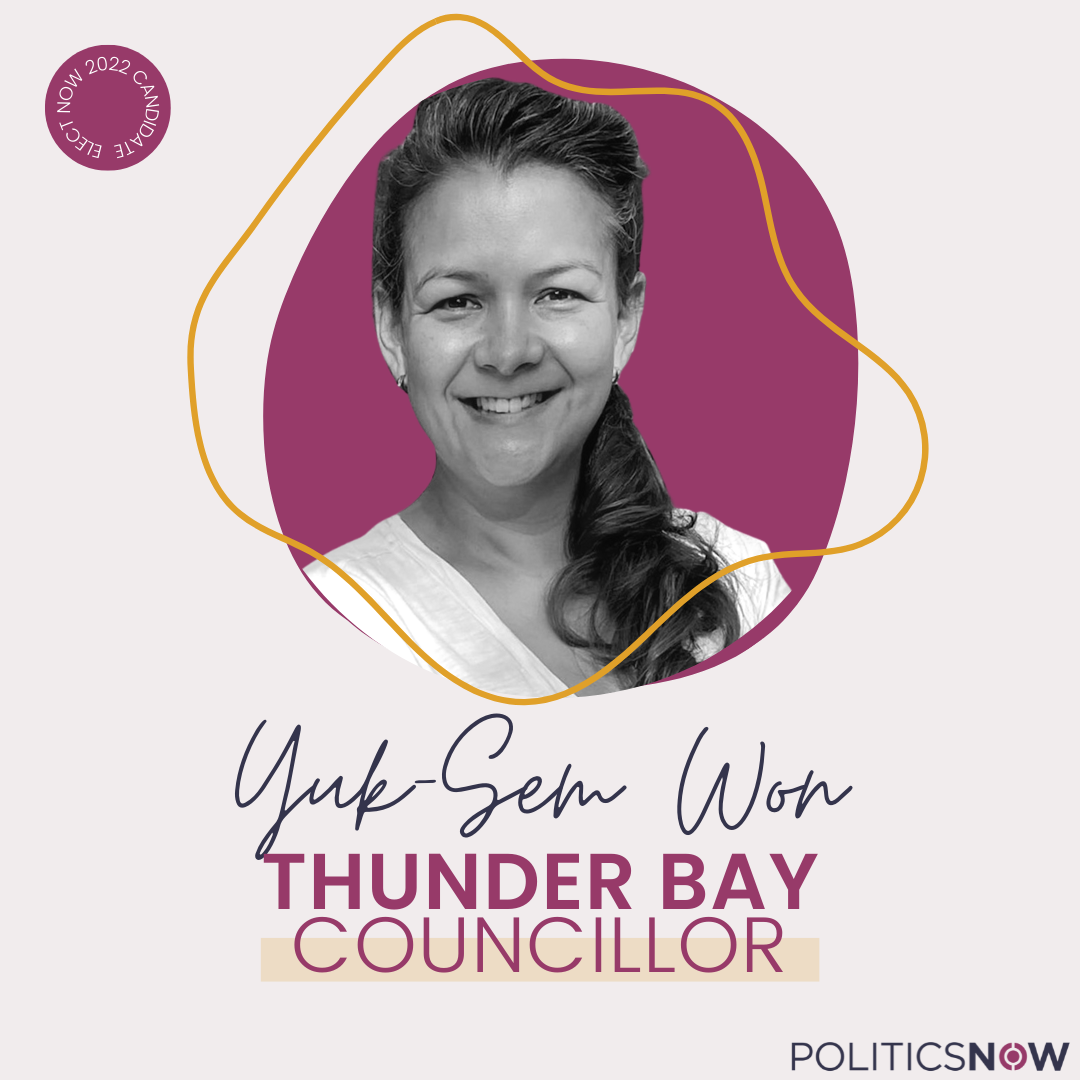Yuk-Sem Won is running for Council in Neebing Ward in Thunder Bay.
Yuk-Sem Won (she/her/elle) is a Labour Law litigator, Part-Time Faculty Member at Confederation College specializing in Business, and has a background in Education. She has raised her family, established her career and has over 30 years of volunteering and governance experience, including the Thunder Bay District Labour Council, TBay Business Women’s Network, Accueil francophone, TBay Chinese Canadian Association, and the Orange Abinoojiinh Movement for Residential School Survivors. She has never been able to ‘just wait’ for change to happen but chooses to invest time and energy to be a part of the change she wants to see. This is the foundation of her community leadership and interest in politics. As Neebing Ward Councillor, she wants to bring her experience, knowledge, and advocacy skills to city council. She appreciates the non-partisan structure of municipal politics, focusing on collaboration and respectful advocacy for the needs of the people, economic development and the well-being of the community.
Why are you running for this position?
I have been involved in the background of politics for 20 years and was a candidate in the 2019 and 2021 Federal elections. My community engagement, leadership and knowledge of issues across the Northwest have been recognized and valued at many levels. I have decided to focus my efforts on the people of Thunder Bay and my Ward of Neebing to ensure we have a strong experienced voice at City Council. I am a trusted and experienced voice in Thunder Bay and have a proven record of positive engagement and advocacy that I believe our Ward needs over the next four years.
What innovative projects would enhance life in your municipality?
I believe that Thunder Bay must focus on improving the quality of life for all residents, investing wisely in projects and programs that are founded on equity and access. We need to work together as a Council to review proposals such as the sports complex, mental health and addictions rehabilitation, affordable housing and safe/accessible community spaces.
If you received a $1 million grant to use for your municipality any way you wanted, what would you do with it?
I would leverage the money with funding opportunities to focus on a mental health rehabilitation centre for the Northwest. Alternatively, on a smaller scale in the Ward, I would leverage the monies for safe and accessible pedestrian walkways for Neebing.
What do you think are the greatest challenges your municipality faces?
The major issues are rooted in equity and affordability. We need to look at affordable housing, poverty, addictions, safety and economic development.
Other than the official ways of communicating (minutes, municipal notes), how else will you reach out to your constituents to involve them in the decision making process?
I would like to engage the residents of the Ward in targeted and public consultation; be accessible for meeting with groups and individuals through calls, email or in-person visits; provide regular updates through email or mailing, as well as the potential for a newsletter for Ward residents. There is nothing quite like knocking door-to-door and meeting residents to ensure that they know who you are and can count on you to be there if and when they need you or when you as a Councilor need to hear from them.
What is your favourite thing to do in your municipality?
Neebing Ward is a haven of little corners of paradise: rural spaces within the City. Making the Ward more accessible for walking safely would be valued by all residents. Within Thunder Bay, my time has always been spent out in the community, participating and meeting people at events, bringing my family out to enjoy the many spaces that the City has to offer. I like to focus my time on events that bring awareness to equity, diversity and positive community projects. As a community leader, I value the many invitations and opportunities to celebrate programs and spaces and often organize events that enrich our lives.
Why do you think it’s important for women to be represented in civic leadership, including on committees, boards and municipal councils?
It has become both a buzzword and a taboo to talk about equity and diversity in leadership. The reality is that women and racialized voices are still very much under-represented. We need to realize that our decision-making and the way we behave are rooted in our lived experience, we each bring a way of thinking, acting, and questioning that has been built over our lifetimes. It is evident that there is a difference in lived experience, the understanding and impact of power and privilege, and how our differing experiences shape how we think and behave. True public representation must reflect the population we serve and have the voices, experiences and vision of diverse leadership.
What does a ‘feminist city’ mean to you?
My first reaction is to cringe, yes, even as a woman, because I have faced the backlash of trying to advocate for women and racialized issues in politics. I am sad that it is likely a societal reaction of thinking that in the year 2022, we don't need to talk about the word feminism anymore: aren't we done with that from the suffragette and women's lib movements of last century? Then my better sense jumps in, and I push past the taboo of the words to really think about what a feminist city could be. A city that has open and welcoming spaces for women; that values their issues and realities; that remembers to look at things from various perspectives; that focuses on projects and initiatives for their reality; that pays attention to the issues and concerns, taking the time and effort to view them with a lens of the reality of women (think safety, family, roles and responsibilities, etc); that always takes an equity lens on decisions because the voices and realities of all people are taken into consideration. That power and privilege are shared. That voices are given weight. That decisions can be different because of the lived realities of the societal roles, responsibilities and expectations of women. We need to strive for true representation of the population in leadership, especially within our City. And for that, people need to stop cringing at the word feminism and start accepting it as empowerment of half the population in a shared responsibility.
Please identify the most critical policy, project, or initiative in your platform that addresses systemic barriers faced by women in your municipality, and describe why:
The idea of a mental health and addictions centre for the Northwest is desperately needed and should have a component that focuses on women. The importance of safety in the community for women is a hushed conversation, and we need to bring focus and attention to it. The ideas of "general public" endeavours are great for accessibility, but we must also remember the voices and realities that are lost in the general, and forgotten by the public. We have to review each policy, project and initiative with a diversity lens, ensuring we make space and actively seek out these perspectives.
Social Media Handles
Where can people find you?
TBPL meet and greet Oct 3; email or call, or I hope to see you at your door!


